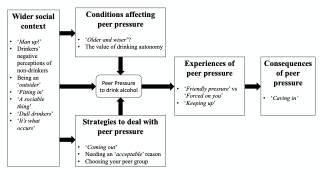Peer pressure and alcohol consumption in adults living in the UK: a systematic qualitative review.
Journal article
Morris, H., Larsen, J., Catterall, E., Moss, A.C. and Dombrowski, S. (2020). Peer pressure and alcohol consumption in adults living in the UK: a systematic qualitative review. BMC Public Health. 20 (1), p. 1014. https://doi.org/10.1186/s12889-020-09060-2
| Authors | Morris, H., Larsen, J., Catterall, E., Moss, A.C. and Dombrowski, S. |
|---|---|
| Abstract | Peer pressure to drink alcohol may influence excessive alcohol consumption, which can have adverse impacts on health and wellbeing. While peer pressure to drink alcohol is extensively studied among youth, less examination exists among adults. This systematic review examined qualitative research studies which explored the role and concept of peer pressure within the context of alcohol consumption in adults living in the UK. Qualitative studies which explored peer pressure within the context of alcohol consumption or alcohol related behaviours and views in adults (age range approximately 18-52 years) living in the UK were included. Systematic searches conducted in Medline, PsycINFO and Web of Science identified 1462 references, of which 13 studies met inclusion criteria. Thematic analysis was conducted. Five overarching themes were identified. Four of these themes directly address aspects of peer pressure, including: experiences of peer pressure; consequences of peer pressure; strategies to deal with peer pressure; and conditions perceived to affect peer pressure. The fifth overarching theme explains the wider social context influencing peer pressure. Pressure to drink alcohol affects individuals across the life span and can be experienced as overt and aggressive, or subtle and friendly. Those consuming little or no alcohol are more likely to feel overt forms of peer pressure. Some developed strategies to cope with pressure from drinkers. Peer pressure can result in feelings of social isolation, or giving in by consuming alcohol against ones wishes. Peer pressure to drink alcohol is a complex and multifaceted phenomenon experienced across adulthood requiring better understanding to support initiatives to decrease the impact of pressure-inducing environments and develop strategies to deal with perceived pressure conditions. The protocol for this review is registered with PROSPERO ( CRD42019122201 ). Registered 11 February 2019. |
| Keywords | Adults; Alcohol; Evidence synthesis; Peer pressure; Qualitative |
| Year | 2020 |
| Journal | BMC Public Health |
| Journal citation | 20 (1), p. 1014 |
| Publisher | BMC |
| ISSN | 1471-2458 |
| Digital Object Identifier (DOI) | https://doi.org/10.1186/s12889-020-09060-2 |
| Publication dates | |
| Online | 07 Jul 2020 |
| Publication process dates | |
| Accepted | 04 Jun 2020 |
| Accepted author manuscript | License File Access Level Open |
| Accepted author manuscript | License File Access Level Open |
| Accepted author manuscript | License File Access Level Open |
| Accepted author manuscript | License File Access Level Open |
Permalink -
https://openresearch.lsbu.ac.uk/item/8q088
Download files
Accepted author manuscript
| Peer pressure_for submission_BMCPH_Revision_FINAL_v4.docx | ||
| License: CC BY 4.0 | ||
| File access level: Open | ||
| Appendix 1 - Full database search strategy.docx | ||
| License: CC BY 4.0 | ||
| File access level: Open | ||
| Figure 1. PRISMA flow diagram.doc | ||
| License: CC BY 4.0 | ||
| File access level: Open | ||
| Figure 2. Peer pressure organising framework.jpg | ||
| License: CC BY 4.0 | ||
| File access level: Open | ||
619
total views991
total downloads2
views this month0
downloads this month
